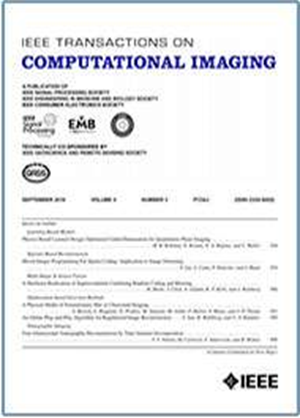Exploring Quasi-Global Solutions to Compound Lens Based Computational Imaging Systems
IF 4.8
2区 计算机科学
Q2 ENGINEERING, ELECTRICAL & ELECTRONIC
引用次数: 0
Abstract
Recently, joint design approaches that simultaneously optimize optical systems and downstream algorithms through data-driven learning have demonstrated superior performance over traditional separate design approaches. However, current joint design approaches heavily rely on the manual identification of initial lenses, posing challenges and limitations, particularly for compound lens systems with multiple potential starting points. In this work, we present Quasi-Global Search Optics (QGSO) to automatically design compound lens based computational imaging systems through two parts: (i) Fused Optimization Method for Automatic Optical Design (OptiFusion), which searches for diverse initial optical systems under certain design specifications; and (ii) Efficient Physic-aware Joint Optimization (EPJO), which conducts parallel joint optimization of initial optical systems and image reconstruction networks with the consideration of physical constraints, culminating in the selection of the optimal solution in all search results. Extensive experimental results illustrate that QGSO serves as a transformative end-to-end lens design paradigm for superior global search ability, which automatically provides compound lens based computational imaging systems with higher imaging quality compared to existing paradigms.探索基于复合透镜的计算成像系统的准全局解决方案
最近,通过数据驱动学习同时优化光学系统和下游算法的联合设计方法比传统的单独设计方法表现出更优越的性能。然而,目前的联合设计方法严重依赖于人工识别初始透镜,这带来了挑战和局限性,特别是对于具有多个潜在起点的复合透镜系统。在这项工作中,我们提出准全局搜索光学(QGSO)通过两部分来自动设计基于复合透镜的计算成像系统:(i)自动光学设计的融合优化方法(OptiFusion),它在一定的设计规范下搜索不同的初始光学系统;(ii)高效物理感知联合优化(Efficient physical -aware Joint Optimization, EPJO),即在考虑物理约束的情况下,对初始光学系统和图像重建网络进行并行联合优化,最终在所有搜索结果中选择最优解。大量的实验结果表明,QGSO作为一种具有卓越全局搜索能力的变革性端到端透镜设计范式,可自动提供比现有范式更高成像质量的基于复合透镜的计算成像系统。
本文章由计算机程序翻译,如有差异,请以英文原文为准。
求助全文
约1分钟内获得全文
求助全文
来源期刊

IEEE Transactions on Computational Imaging
Mathematics-Computational Mathematics
CiteScore
8.20
自引率
7.40%
发文量
59
期刊介绍:
The IEEE Transactions on Computational Imaging will publish articles where computation plays an integral role in the image formation process. Papers will cover all areas of computational imaging ranging from fundamental theoretical methods to the latest innovative computational imaging system designs. Topics of interest will include advanced algorithms and mathematical techniques, model-based data inversion, methods for image and signal recovery from sparse and incomplete data, techniques for non-traditional sensing of image data, methods for dynamic information acquisition and extraction from imaging sensors, software and hardware for efficient computation in imaging systems, and highly novel imaging system design.
 求助内容:
求助内容: 应助结果提醒方式:
应助结果提醒方式:


